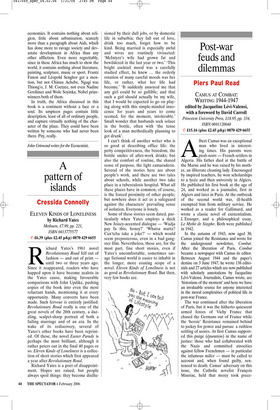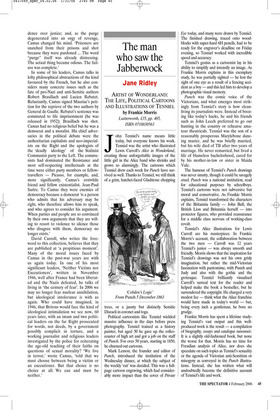Post-war feuds and dilemmas
Piers Paul Read
CAMUS AT COMBAT: WRITING 1944-1947 edited by Jacqueline Lévi-Valensi, with a foreword by David Carroll Princeton University Press, £18.95, pp. 334, ISBN 0691120048 ✆ £15.16 (plus £2.45 p&p) 0870 429 6655 Albert Camus was an exceptional man who lived in interesting times. His parents were pieds-noirs — French settlers in Algeria. His father died at the battle of the Marne and he was raised by his mother, an illiterate cleaning lady. Encouraged by inspired teachers, he won scholarships to a lycée and then university in Algiers. He published his first book at the age of 24, and worked as a journalist, first in Algiers and later in Paris. At the outbreak of the second world war, ill-health exempted him from military service. He worked as a reader for Gallimard, and wrote a classic novel of existentialism, L’Etranger, and a philosophical essay, Le Mythe de Sisyphe. Both were published in 1942.
In the autumn of 1943, now aged 30, Camus joined the Resistance and wrote for the underground newsletter, Combat. After the liberation of Paris, Combat became a newspaper with Camus its editor. Between August 1944 and the paper’s demise on 3 June 1947, he wrote 138 editorials and 27 articles which are now published with scholarly annotations by Jacqueline Lévi-Valensi. Journalists, Camus wrote, are ‘historians of the moment’ and here we have an invaluable source for anyone interested in the moral complexities of political life in post-war France.
The war continued after the liberation of Paris, but it was the hitherto quiescent armed forces of Vichy France that chased the Germans out of France while the ‘heroic’ Resistance remained behind to jockey for power and pursue a ruthless settling of scores. At first Camus supported this purge (épuration) in the name of justice: those who had collaborated with the Nazis and committed atrocities against fellow Frenchmen — in particular the infamous milice — must be called to account and, when found guilty, sentenced to death. Camus’ adversary on this issue, the Catholic novelist François Mauriac, held that mercy took prece dence over justice; and, as the purge degenerated into an orgy of revenge, Camus changed his mind. ‘Prisoners are snatched from their prisons and shot because they were pardoned ... The word “purge” itself was already distressing. The actual thing became odious. The failure was complete.’ In some of his leaders, Camus talks in lofty philosophical abstractions of the kind favoured by the French, but he also considers many concrete issues such as the fate of pro-Nazi and anti-Semitic authors Robert Brasillach and Lucien Rebatet. Reluctantly, Camus signed Mauriac’s petition for the reprieve of the two authors by General de Gaulle. Rebatet’s sentence was commuted to life imprisonment (he was released in 1952); Brasillach was shot. Camus had no religious belief but he was a democrat and a moralist. His chief adversaries in the political debate were the authoritarian capitalists and neo-imperialists on the Right and the apologists of the ‘deadly ideology’ of the Stalinist Communist party to the Left. The communists had dominated the Resistance and most self-respecting intellectuals at the time were either party members or fellowtravellers — Picasso, for example, and, more significantly, Camus’s erstwhile friend and fellow existentialist, Jean-Paul Sartre. To Camus they were enemies of democracy because a democrat ‘is a person who admits that his adversary may be right, who therefore allows him to speak, and who agrees to consider his argument. When parties and people are so convinced by their own arguments that they are willing to resort to violence to silence those who disagree with them, democracy no longer exists.’ David Carroll, who writes the foreword to this collection, believes that they are published at ‘a propitious moment’. Many of the moral issues faced by Camus in the post-war years are with us again today. In one of his most significant leaders, ‘Neither Victims nor Executioners’, written in November 1946, well after France had been liberated and the Nazis defeated, he talks of living in ‘the century of fear’. In 2006 we may no longer fear nuclear annihilation, but ideological intolerance is with us again. Who could have imagined, in 1946, that Britons would face the kind of ideological intimidation we see now, 60 years later, with an imam and two political leaders on the far Right prosecuted for words, not deeds, by a government possibly complicit in torture, and a working journalist and religious leaders investigated by the police for reiterating the age-old teaching of their faiths on questions of sexual morality? ‘We live in terror,’ wrote Camus, ‘told that we must choose between being a victim or an executioner. But that choice is no choice at all. We can and must be neither.’






























































































































 Previous page
Previous page